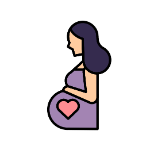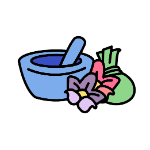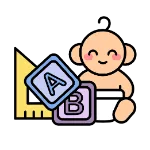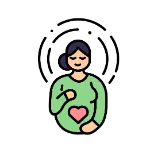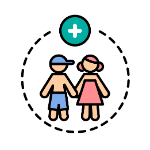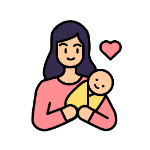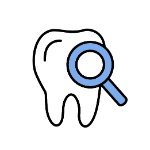
List Of 13 Common Health Complications Of Pregnancy
Your thoughts and feelings may go into overdrive when you find out you're pregnant. You may be just as delighted, as you are scared about the new person you will bring into the world. The majority of pregnancies go smoothly.
(Image credits to Canva)
However, about 8% of all pregnancies have complications that, if ignored, might jeopardize the mother or the baby’s health. While some difficulties are related to pre-existing health issues, others arise suddenly and are unavoidable.
During pregnancy, your body plays an important role. Changes can be irritating or uncomfortable at times, and you may be anxious sometimes. There's rarely a need to be alarmed, but you should tell your physician about any concerns you have. To know some common problems read our list of 13 common health complications of pregnancy.
#1 High BP
High blood pressure also known as hypertension occurs when arteries transporting blood from the heart to the organs narrow down. The arteries' pressure rises as a result of this. This can make it difficult for blood to reach the placenta, which supplies nourishment and oxygen to the fetus throughout pregnancy.
(Image credits to Canva)
Reduced blood supply can cause the fetus to develop slowly, putting the mother at risk for premature labor and preeclampsia. Women who have high blood pressure before pregnancy will need to monitor and control it during their pregnancy.
#2 Gestational Diabetes
Gestational diabetes develops when a mother did not have diabetes before pregnancy but gets it after pregnancy. Parts of your foods are normally digested into a sugar called glucose by your body. Glucose is your body's primary energy source. After digestion, glucose enters your bloodstream and provides energy to your body.
(Image credits to Canva)
Your pancreas produces the hormone insulin to transport glucose from your bloodstream to your body's cells. Hormonal changes caused by pregnancy lead the body to either not create enough insulin or not utilize it properly, resulting in gestational diabetes. The best way to avoid or prevent complications linked with high blood sugar during pregnancy is to manage gestational diabetes by following a treatment plan given by your doctor.
#3 Placenta Previa
This is one of the common health complications of pregnancy. The placenta supplies oxygen and nourishment for your baby's optimal development while you're pregnant. The placenta usually connects to the upper portion of the uterus, however in the placenta previa, it covers the cervix completely or partially.
You can't stop placenta previa from happening. Regular prenatal care, on the other hand, can improve your and your baby's health. Don’t forget to consult your physician if you are at high risk because of prior surgery, C-section, or fibroids. During your pregnancy, he or she may want to keep a closer eye on you.
#4 Mental Health Issues
During or after pregnancy, some new moms develop depression. The following are signs and symptoms of depression:
(Image credits to Canva)
- Being in a low mood constantly.
- Loss of enthusiasm for fun activities.
- Appetite, sleep, and energy levels fluctuate.
- Problems in thinking, attentiveness, and decision-making.
- Feelings of failure, sorrow, or remorse.
- Having thoughts like life is not worth living.
#5 Hyperemesis Gravidarum
Morning sickness and other discomforts are common among pregnant women, however people with Hyperemesis Gravidarum (HG) have morning sickness multiplied by 1,000. HG is extreme nausea that causes rapid weight loss and it may require hospitalization.
(Image credits to Canva)
If you've been diagnosed with HG, the most important thing is to make sure you're getting enough nutrients to keep both you and your baby healthy. Some women may be able to get by on a bland diet and plenty of water, while others may require medicine to help them feel better. You may need to be hospitalized in extreme situations to receive nutrition and fluids through an intravenous (IV) line.
#6 Obesity and Weight Gain
The amount of weight you develop throughout pregnancy is critical for the health of your pregnancy as well as your and your baby's long-term health. Pregnancy weight gain that is less than the acceptable amount is linked to having a baby that is too small. Some babies who are born too small may have trouble breastfeeding on to their mothers, are more prone to sickness, and have developmental problems.
(Image credits to Canva)
Gaining more weight than is recommended during pregnancy is linked to having a baby that is born excessively large, which can result in birth difficulties, cesarean delivery, and childhood obesity. Gaining more weight than is suggested might increase the amount of weight you keep after you give birth, which can lead to obesity.
#7 Incontinence in Pregnancy
During and after pregnancy, incontinence is a typical issue. When you cough, laugh, sneeze, move quickly, or even stand up from a sitting posture, you may be unable to prevent a sudden jet of urine. This condition might be temporary, as the pelvic floor muscles relax a bit to prepare for the baby’s arrival. You will find several exercises which can help you to strengthen your pelvic floor muscles.
#8 Feeling Faint
While you are pregnant, you may experience dizziness as well. Hormonal shifts are to blame for this. Fainting occurs when your brain does not receive enough blood and, which means not enough oxygen.
(Image credits to Canva)
You're more likely to pass out if you get out of a chair or a bath too quickly, but it can also happen when you're resting on your back. In later pregnancy or during labor, it's best not to lay flat on your back. After 28 weeks, you should avoid sleeping on your back since it has been linked to a greater risk of stillbirth.
#9 Cramp
Cramp is a sudden, sharp pain, usually in your calf muscles or feet. It especially happens at night. Regular moderate exercise, especially ankle and leg exercises will enhance your circulation and may help reduce cramps during pregnancy. You can try the following foot exercises:
(Image credits to Canva)
- 30 times firmly bend and extend your foot up and down.
- Rotate your foot eight times in one direction and eight times in the opposite direction.
- Rep with the opposite foot.
Pulling your toes up towards your ankle or rubbing the muscle gently may help relieve your cramp.
#10 Constipation
Early on in your pregnancy, hormonal changes in your body may cause you to feel constipated. You may prevent constipation by doing the following:
(Image credits to Canva)
- Eat foods that are rich in fiber, like wheat bread and cereals, fruits, vegetables, pulses, beans, and lentils.
- To maintain your muscles toned, work out on a regular basis.
- Drink lots of water.
- Iron supplements should be avoided since they might cause constipation – Consult your doctor to see if you can go without them or switch to a different type.
#11 Peeing a Lot
Peeing often generally begins early in pregnancy and might last until the baby is born. It's caused by the baby's head pressing against your bladder during pregnancy. If you find yourself needing to wake up in the middle of the night to pee, consider cutting out late-night beverages. To keep hydrated, drink lots of non-alcoholic, caffeine-free fluids throughout the day. If you have discomfort when urinating or pass blood in your urine, you may have a urinary infection that requires medical attention.
#12 Skin and Hair Change
During pregnancy, hormonal changes may cause your nipples and the region around them to darken. It's also possible that your skin will darken somewhat, either in spots or all over. Darkening of birthmarks, moles, and freckles is also possible. A black line may appear in the center of your tummy. After the baby is born, these changes will disappear gradually, but your nipples may stay darker.
#13 Feeling Hot
During pregnancy, you'll probably feel hotter than normal. Hormonal changes and an increase in blood flow to the skin are to blame for this problem. It can be helped if you:
(Image credits to Canva)
- Wear loose clothes made out of cotton as it is more absorbent and breathable.
- Keep your room cool.
- Wash hands and face more frequently.
We hope you liked reading our article on the list of 13 common health complications of pregnancy. These are some of the common problems the moms might face. But don’t be afraid! Since pregnancy comes with several changes in your body it’s very obvious to face some health complications.
HappyPreggie always cares about all the moms out there. We try our best to help moms with the best information possible. If you liked this article you might also like our article How Do I Choose The Perfect Confinement Centre? and 5 Common Causes You Should Know About Pregnancy Loss And Miscarriage.
